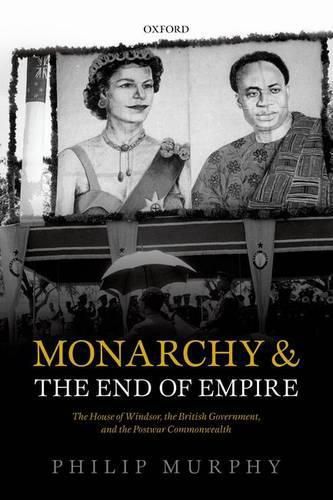Readings Newsletter
Become a Readings Member to make your shopping experience even easier.
Sign in or sign up for free!
You’re not far away from qualifying for FREE standard shipping within Australia
You’ve qualified for FREE standard shipping within Australia
The cart is loading…






This unique and meticulously-researched study examines the triangular relationship between the British government, the Palace, and the modern Commonwealth since 1945. It has two principal areas of focus: the monarch’s role as sovereign of a series of Commonwealth Realms, and quite separately as head of the Commonwealth. It traces how, in the early part of the twentieth century, the British government promoted the Crown as a counterbalance to the centrifugal forces that were drawing the Empire apart. Ultimately, however, with newly-independent India’s determination to become a republic in the late 1940s, Britain had to accept that allegiance to the Crown could no longer be the common factor binding the Commonwealth together. It therefore devised the notion of the headship of the Commonwealth as a means of enabling a republican India ‘to continue to give the monarchy a pivotal symbolic role and therefore to remain in the Commonwealth.'In the years of rapid decolonization which followed 1945, it became clear that this elaborate constitutional infrastructure posed significant problems for British foreign policy. The system of Commonwealth Realms was a recipe for confusion and misunderstanding. Policy makers in the UK increasingly saw it as a liability in terms of Britain’s relations with its former colonies, so much so that by the early 1960s they actively sought to persuade African nationalist leaders to adopt republican constitutions on independence. The headship of the Commonwealth also became a cause for concern, partly because it offered opportunities for the monarch to act without ministerial advice, and partly because it tended to tie the British government to what many within the UK had begun to regard as a largely redundant institution. Philip Murphy employs a large amount of previously-unpublished documentary evidence to argue that the monarchy’s relationship with the Commonwealth, which was initially promoted by the UK as a means of strengthening Imperial ties, increasingly became an source of frustration for British foreign policy makers.
$9.00 standard shipping within Australia
FREE standard shipping within Australia for orders over $100.00
Express & International shipping calculated at checkout
This unique and meticulously-researched study examines the triangular relationship between the British government, the Palace, and the modern Commonwealth since 1945. It has two principal areas of focus: the monarch’s role as sovereign of a series of Commonwealth Realms, and quite separately as head of the Commonwealth. It traces how, in the early part of the twentieth century, the British government promoted the Crown as a counterbalance to the centrifugal forces that were drawing the Empire apart. Ultimately, however, with newly-independent India’s determination to become a republic in the late 1940s, Britain had to accept that allegiance to the Crown could no longer be the common factor binding the Commonwealth together. It therefore devised the notion of the headship of the Commonwealth as a means of enabling a republican India ‘to continue to give the monarchy a pivotal symbolic role and therefore to remain in the Commonwealth.'In the years of rapid decolonization which followed 1945, it became clear that this elaborate constitutional infrastructure posed significant problems for British foreign policy. The system of Commonwealth Realms was a recipe for confusion and misunderstanding. Policy makers in the UK increasingly saw it as a liability in terms of Britain’s relations with its former colonies, so much so that by the early 1960s they actively sought to persuade African nationalist leaders to adopt republican constitutions on independence. The headship of the Commonwealth also became a cause for concern, partly because it offered opportunities for the monarch to act without ministerial advice, and partly because it tended to tie the British government to what many within the UK had begun to regard as a largely redundant institution. Philip Murphy employs a large amount of previously-unpublished documentary evidence to argue that the monarchy’s relationship with the Commonwealth, which was initially promoted by the UK as a means of strengthening Imperial ties, increasingly became an source of frustration for British foreign policy makers.